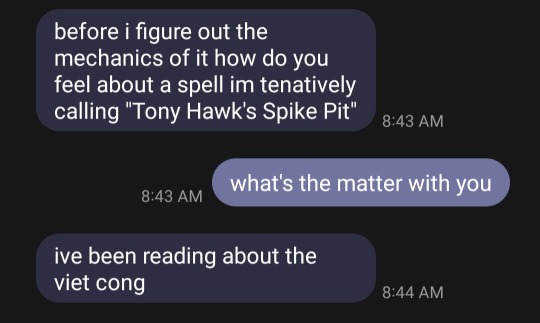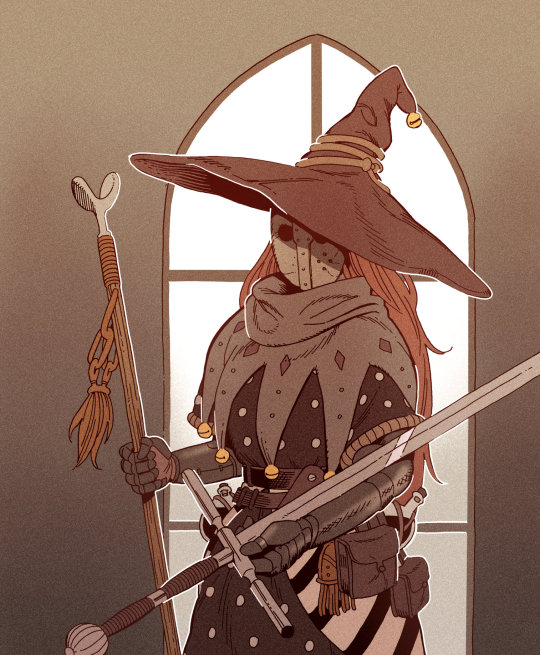Don't wanna be here? Send us removal request.
Text
everyone likes to talk about fucked up joke spells like "super brain hemmorage" and "fill lungs with water" but i let my players make spells once theyre a certain level and my sorceror just sent me this text

33K notes
·
View notes
Photo


Adventurer’s Items
I’ve got a digital book filled with items too ⚔️
422 notes
·
View notes
Text
Sometimes i think about the idea of Common as a language in fantasy settings.
On the one hand, it’s a nice convenient narrative device that doesn’t necessarily need to be explored, but if you do take a moment to think about where it came from or what it might look like, you find that there’s really only 2 possible origins.
In settings where humans speak common and only Common, while every other race has its own language and also speaks Common, the implication is rather clear: at some point in the setting’s history, humans did the imperialism thing, and while their empire has crumbled, the only reason everyone speaks Human is that way back when, they had to, and since everyone speaks it, the humans rebranded their language as Common and painted themselves as the default race in a not-so-subtle parallel of real-world whiteness.
In settings where Human and Common are separate languages, though (and I haven’t seen nearly as many of these as I’d like), Common would have developed communally between at least three or four races who needed to communicate all together. With only two races trying to communicate, no one would need to learn more than one new language, but if, say, a marketplace became a trading hub for humans, dwarves, orcs, and elves, then either any given trader would need to learn three new languages to be sure that they could talk to every potential customer, OR a pidgin could spring up around that marketplace that eventually spreads as the traders travel the world.
Drop your concept of Common meaning “english, but in middle earth” for a moment and imagine a language where everyone uses human words for produce, farming, and carpentry; dwarven words for gemstones, masonry, and construction; elven words for textiles, magic, and music; and orcish words for smithing weaponry/armor, and livestock. Imagine that it’s all tied together with a mishmash of grammatical structures where some words conjugate and others don’t, some adjectives go before the noun and some go after, and plurals and tenses vary wildly based on what you’re talking about.
Now try to tell me that’s not infinitely more interesting.
100K notes
·
View notes
Text

eternal WIP i finally coloured up. wanted to draw some of sir heaven's arming clothes & figure out the headgear layering
knights never cut their hair because it is believed to aid with their dialogues with the holy beasts. as a result of the fumes, their hair bleaches over time and the ends are so fried that they basically just crumble away
2K notes
·
View notes
Text
some people think writers are so eloquent and good with words, but the reality is that we can sit there with our fingers on the keyboard going, “what’s the word for non-sunlight lighting? Like, fake lighting?” and for ten minutes, all our brain will supply is “unofficial”, and we know that’s not the right word, but it’s the only word we can come up with…until finally it’s like our face got smashed into a brick wall and we remember the word we want is “artificial”.
227K notes
·
View notes
Text
Kinda in love with the idea that different places on other sides of the world can look so similar. Something something universal human experiences
86K notes
·
View notes
Text
Tabletop RPG about a band of epic heroes with full sentences for names on a quest to murder God and shatter His throne, as one does, except the epic heroes in question are a mob of foot-tall gremlinny critters who are not 100% sure what "God" actually is, and they're not about to let that stop them. The game features an elaborately statted-out bestiary of "divine beasts" to fight which the human reader will recognise as things that are neither divine nor beasts; the climactic battle of the example scenario involves the player characters going Shadow of the Colossus on what is clearly a windmill.
11K notes
·
View notes
Text

I call this one "what if salmon just kept getting worse"
69K notes
·
View notes
Text
concept: angels but they look like stingray skeletons
115K notes
·
View notes
Text
big fan of creatures that are both divine and mechanical
43K notes
·
View notes
Text

Why haven’t more people written about magic-users going to the moon? I can think of a single solitary book I’ve read that had dragons living there, but that’s it. What about the magicians who want to explore, the wizards who want to get away from it all, the sorcerors who screw up royally?
There are so many reasons for magic-using characters to wind up on the moon, and I would love to read about them.
866 notes
·
View notes
Photo

Stone-hewn graves at Heysham, Lancashire. Believed to be 11th Century.
70K notes
·
View notes
Text
Broke: vampires are vulnerable to the trappings of Christianity only, particularly Catholicism, no matter how dubiously applied. (See: Van Helsing's Communion wafer grouting).
Woke: vampires are vulnerable to sincere faith of all kinds, and atheist vampire-hunters need to believe very strongly in the Power of Friendship or their love of Star Trek to get by.
Bespoke: vampires are vulnerable to the faith that they followed when they were alive, and hunters tracking down an ancient vampire are obliged to learn about Neo-Babylonian theology or Middle Palaeolithic bear cults.
65K notes
·
View notes



